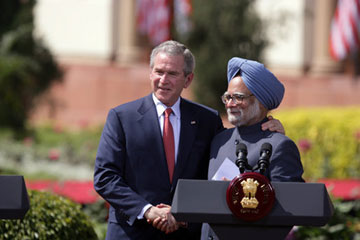 President Bush praises pact, predicts Congress will approve deal March 02, 2006
Bush hailed the agreement as a way to move beyond the era of fossil fuels and ease pressure on global energy markets.
The deal has stirred controversy since the two leaders first proposed the idea during their July 2005 summit in Washington, in part because India is not a signatory of the Nuclear Non-Proliferation Treaty. However, Bush defended his decision to move ahead with the agreement, saying that India has taken adequate measures to ensure against proliferation risks. "I'm trying to think differently, not to stay stuck in the past, and recognize that by thinking differently, particularly on nuclear power, we can achieve some important objectives, one of which is less reliance on fossil fuels; second is to work with our partners to help both our economies grow; and thirdly is to be strong on dealing with the proliferation issues," Bush told reporters in New Delhi March 2. Singh said that India has completed a plan to separate its civil and military nuclear facilities, which was a requirement laid out in the initial proposal in July 2005. He said India also would approach the International Atomic Energy Agency (IAEA) about establishing a set of nonproliferation safeguards for the Indian nuclear industry. Bush now faces the task of convincing the U.S. Congress to accept the agreement. New legislation would be needed to make the technology exchanges possible. The president expressed optimism that he would be able to obtain congressional approval of the plan. "[T]he first thing I will say to our Congress is that our relationship is changing to the better," Bush said, referring to the increased trade ties and international political cooperation between the two countries. "[T]he other thing that our Congress has got to understand, that it's in our economic interests that India have a civilian nuclear power industry to help take the pressure off of the global demand for energy," he said. "Obviously, nuclear power is a renewable source of energy, and the less demand there is for non-renewable sources of energy, like fossil fuels, the better off it is for the American people." Singh said the growing ties between India and the United States are also in India's best interests. "Many of the areas that our cooperation now covers are essential to India's national development," he said. "They include energy, agriculture, science and technology, trade and investment, high technology, health and a clean environment."
On the Web:
|
||
